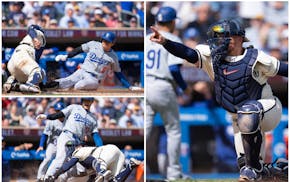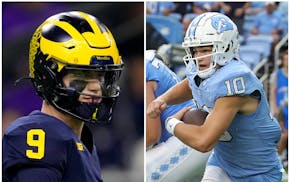Ohio State athletic director Gene Smith is scheduled to receive a bonus worth $18,000 because a Buckeyes wrestler won an individual national title.
Think about that for a second. An athletic director with an annual base salary of nearly $1 million is guaranteed an extra week of pay — based on a performance clause in his contract — even though he had no personal investment in the blood, sweat and sacrifice that Logan Stieber put into winning the 141-pound championship.
But by all means, the NCAA and its member institutions should continue to cling to their archaic notion of amateurism. It's all about doing what's best for the student-athletes, right? Nonsense.
Thankfully, a movement to reward college athletes financially beyond a scholarship continues to gain momentum. This era of astronomical TV contracts has become a game-changer and further exposed the hypocrisy of the amateurism model.
The NCAA is under siege in public perception and with ongoing antitrust lawsuits. Last week, a regional director of the National Labor Relations Board found that Northwestern football players fit the criteria of employees and should be allowed to unionize.
Pending legal appeals, that landmark case could redefine college athletics and how they operate. College athletes functioning as a union is a fascinating idea, but it's such a radical departure that it's difficult to comprehend the endgame.
Would athletes be able to strike? Could athletic departments institute lockouts? Would every scholarship athlete in every sport be granted membership?
This is a complicated issue with many tentacles, but the Northwestern case should provide more leverage in the anti-amateurism crusade. It's time for real reform. There is unprecedented money being pumped into college sports these days, but the athletes — the ones who provide the labor — remain unpaid participants.
TV networks pay hundreds of millions for broadcast rights. Football and basketball coaches make obscene salaries. The arms race has changed the financial scope of college athletics for everyone except athletes. That doesn't seem right.
The NCAA needs to adopt a system that allows athletes to receive a stipend (preferably $3,000 to $5,000 annually) and also profit from their likenesses. We're not talking about exorbitant payouts, but something that recognizes that athletes deserve a cut of the expanding pie.
Major conferences have expressed support for a stipend model to serve as a full-cost scholarship. The problem is, smaller conferences balk at that idea because they lack the financial means to pay stipends.
I wouldn't support changes that force midtier athletic departments to eliminate sports. But realistically, Texas and Tulsa reside in separate athletic universes, and it's time the NCAA and schools to create a new model.
The common rebuttal in this debate is that athletes receive full-ride scholarships, private tutoring and extra benefits not available to normal students. That's true, and a free education should not be minimized in light of ridiculous tuition costs. Athletes don't leave school saddled with hefty student loans.
But scholarship athletes are not normal students, either, in terms of their responsibilities and value to universities. College football resembles a job in time commitment between practices, film study, weight training, travel, meetings and study hall.
Then there's the financial aspect. How much do you think Florida's athletic department and entire university profited off Tim Tebow's prolific career? How many Johnny Manziel jerseys did Texas A&M sell the past two years?
And yet we're supposed to accept that Manziel deserves not a penny of that action while others get rich off his likeness? Surely the NCAA and its members can develop some mechanism that would allow athletes to profit from their star status.
Would that create some other consequences? Perhaps. Former Gophers quarterback Bryan Cupito joked that his autograph would have fetched "seven cents," but he wonders about potential jealousy inside the locker room.
"At first I think it would definitely make things hard," he said. "But over time, 10 or 20 years from now, people will understand it."
Cupito supports the stipend idea and allowing athletes to be compensated for their likenesses. He's seen the landscape change significantly even since he completed his eligibility in 2006.
"Everybody is making money off TV now, so I don't know why they wouldn't give each scholarship player something like $2,000 a semester," he said. "There has to be some way to reward the player. I just don't know what the solution is."
Status quo shouldn't be an option. Look around college athletics right now. Does it look amateur to you?
Chip Scoggins ascoggins@startribune.com
Scoggins: 'Wait one more year' can't be the Wild's plan. Thankfully, it isn't.

Scoggins: Finch feeling heat of the Suns as playoff battle looms
Scoggins: Why 'championship or bust' fits these Wolves

Scoggins: Anatomy of a game-saving play as Correa throws out Ohtani


